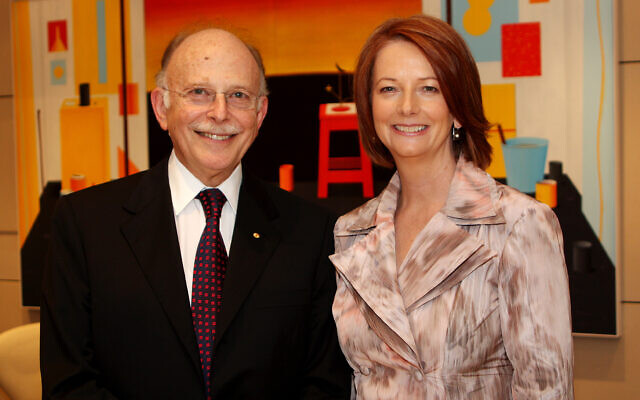Milton Friedman, the ideological godfather of market deregulation, once noted that “only a crisis … produces real change.”
The crisis has come – and with a vengeance. So let’s not let it go to waste. It’s well past time to reassert some control over our working lives.
Australia's most powerful Jewish leader is a man of many parts
In the morning of a warm late summer's day last year, Mark Leibler is getting ready to travel to Israel. We are sitting at a small table in his office, but he is oblivious to the sweeping views of the city that shimmers in the sunlight.
This trip is the first of three visits to Israel Leibler will make in 2019 - this first one in summer, another in midwinter and the last one in spring. He has made these visits for 25 years, ever since he was elected to the two major international Jewish organisations that help determine how the substantial sums of money raised in diaspora communities will be spent on projects in Israel and, increasingly, in diaspora Jewish communities, especially the sixmillion-strong US community.
Even when he is in Israel, when his days are packed with meetings, he will be in constant touch with his office at Arnold Bloch Leibler, where he has been a partner for almost 50 years. He will take and make calls at any time of the day and night, talking to Jewish community leaders and Indigenous leaders who regularly seek him out for advice. Leibler is a man of many parts and he has learnt to move across these parts - from lawyer to Jewish leader to activist on behalf of Indigenous causes - so that each part enriches the others.
He is not well known to most Australians. His name does not appear in the newspapers often, though he has become, over the years, the go-to tax lawyer for financial journalists.
Yet his influence far exceeds his public profile. Of the 200 people and families on the 2019 Rich List, almost one in five are clients of Arnold Bloch Leibler. Partly as a result of this client base, Leibler is widely recognised as one of Australia's most influential tax lawyers. He has given advice and put the case for changes to tax laws to every Australian treasurer since John Howard had the job in the 1970s.
Since the late 90s, when his older brother, Isi, pre-eminent leader of Jews in Australia and a major figure in world Jewry, settled in Israel, Mark Leibler has been recognised as Australia's most influential and powerful Jewish leader, and has become increasingly influential in international Jewry. The Jerusalem Post has described him as one of the world's 50 most influential Jews. He has had, and still has, relationships with Israeli politicians, including prime ministers.
Anyone who has lived such a public life, and has been involved in so many different and seemingly unconnected areas, is bound to have critics and even enemies. Leibler has both. Former senior Australian Taxation Office officials who have had dealings with him have said he has a reputation as a bully who intimidates junior staff members conducting audits of his clients. Within the Jewish community, he has a reputation for being arrogant and a formidable and difficult opponent. Academic and writer Mark Baker, a lifelong Zionist, believes Leibler has tried and has largely succeeded in shutting down any criticism of Israel in the Jewish community.
Moravian born SIGMUND Freud was an active member of B’nai B’rith’s Vienna Lodge, founded in 1895. Which may partly explain how he developed his intriguing idea about the “narcissism of the small difference”. Whatever the reason, I’m grateful that along with the many other rich rewards which Michael Gawenda offers us in The Powerbroker, his new and compellingly readable book about Mark Leibler, he’s included Freud’s revealing gem.
Reflecting on the “hard and often ruthless …” style of
our communal politics, Gawenda notes that the conflicts are “rarely
about ideology”. More often it’s mostly personal. As Freud puts it, “It
is precisely the minor differences in people who are otherwise alike
that form the basis of hostility between them.”
... And if “behind the scenes” scenes are your thing, it
delivers. Chapter and verse. Many times over. Whether it’s about the
Jewish community’s endless shtetl issues, its controversial dealings
with governments that made headlines, or on who’s who on the Rich List.
All there.
A journalist I have known for thirty years once told me that there were two places he wanted to be quoted in. One was the
Read the full article…
Tax savings separately from income: experts back reforms
Superannuation, dividends and savings would be taxed separately from wages and salaries under a plan to overhaul the income tax system with research revealing the nation's poorest and youngest are being hit with the biggest effective tax rates.
The Tax and Transfer Policy Institute based at the Australian National University has found young people are effectively bankrolling the advantages enjoyed by older people who in some cases are getting tax benefits worth more than their savings.
